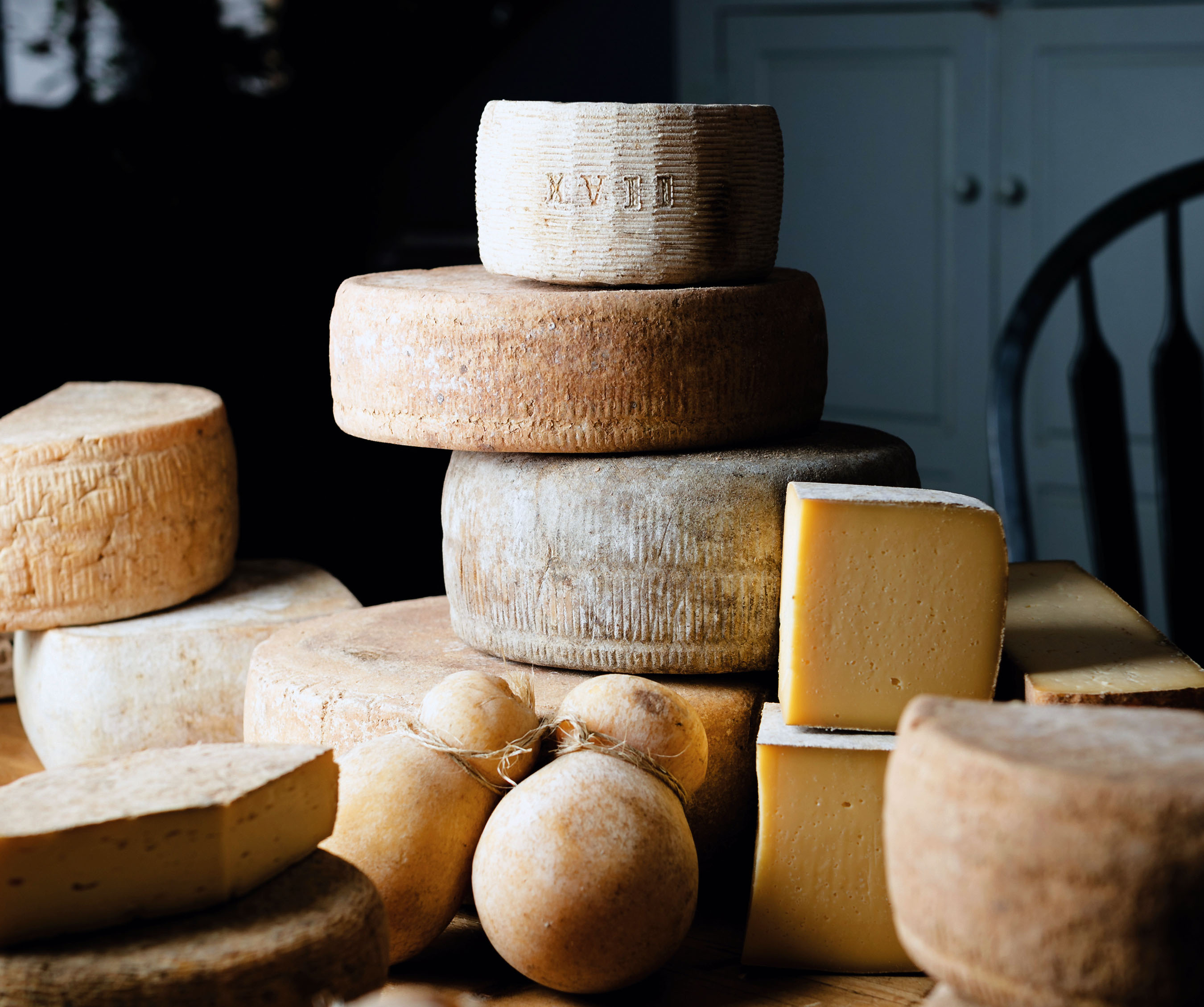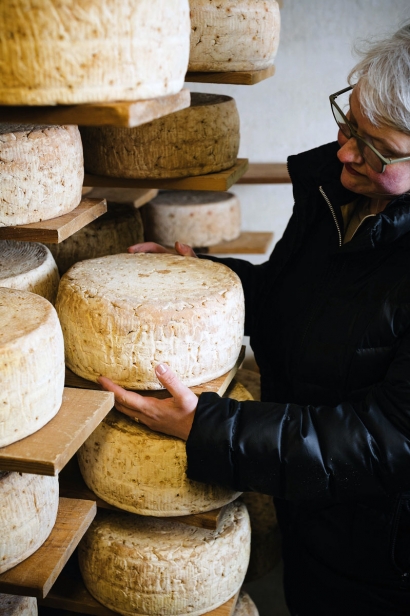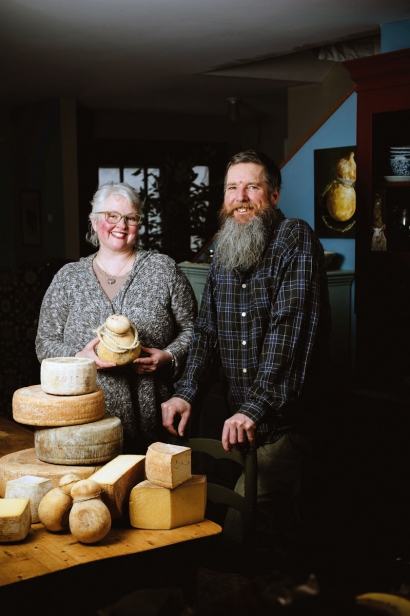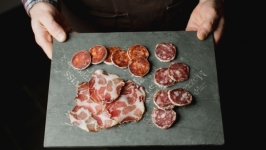It's All About the Milk: Parish Hill Creamery
As my car miraculously wound its way up a very icy driveway, in late January after a thaw and a deep freeze, my only thought: If I actually make it up this road in one piece, I am going to meet a cheese whisperer. Exactly the way artisan food manager Rory Stamp of Burlington’s Dedalus Wine described Peter Dixon when I inquired about Parish Hill Creamery. I remember thinking Hmm … a cheese whisperer—I want to meet him. My trek to Westminster to meet Peter Dixon and his wife, Rachel, was a treasure, despite the icy climb to their house. Together this couple has more passion and devotion to making cheese than almost anyone I’ve ever met—at least the oldfashioned, old-style way—which is clearly what sets these cheesemakers apart from a plethora of talented cheesemakers in our state.
Peter and Rachel don’t just make old-style cheese. They consult nationally and teach artisan cheesemaking workshops for licensed and aspiring cheesemakers. Peter’s knowledge has helped countless cheesemakers around the country and as far away as China and India. Through his Dairy Foods Consulting services, he has played a key role in helping to shape a successful artisan cheese community here in Vermont and beyond.
Not long into our interview at their kitchen table, their sweet dog, Jack by my feet, Rachel appeared with a huge wheel of aged cheese and set it in front of me, and then another, and another. Soon I was faced with an artistic stack of cheese wheels and wedges, assorted shapes and sizes: Humble, Kashar, Hermit, Vermont Herdsman and Reverie. When Rachel produced a sharp knife, I knew I was in for a treat. She carefully sliced off delicate slivers, one cheese at a time, while Peter explained how they were crafted—each one unique and seasoned differently. Humble is a cider-washed tomme using their homemade hard cider. Hermit, a monastery-type cheese with a softer texture, has a rind rubbed in beer from the local Hermit Thrush Brewery in Brattleboro. Suffolk Punch is a gourd-shaped whole milk caciocavallo-style cheese, sharp, crumbly and tangy, aged for at least two months. Rubbing the cheese with olive oil and polishing it during the aging process creates an edible rind. Kashar resembles Italian provolone and tastes buttery and somewhat peppery. Complex, subtle and each unique, Peter shared detailed explanations offering comparisons to cheeses made over 100 years ago in Europe.
Quality milk is everything. The cows that produce the milk for Parish Hill graze on the hillsides five miles away at Elm Lea Farm at the Putney School, a school Peter attended as a young man. The school clearly made an impression on him and instilled a strong work ethic. Peter’s dream was to make cheese without using commercial cultures. Instead he uses local cultures from Elm Lea Farm—cultures from four cows, handpicked and hand-milked. Abigail, Sonya, Helga and Clothilde are Jerseys and Holsteins, favorites of herdsmen Pete Stickney and Phil Ranney, both seventh-generation Vermont dairy farmers. Parish Hill makes cheese May through September when the herd of 35 cows is out happily grazing in the sun and rain, ruminating as cows should to yield milk with high aromatic quality. Seasonal conditions affect the milk and thus the cheese. Weather also plays a role, as cheese made on a wet and stormy day will be different than cheese made during a dry spell. They utilize ingredients closest to home and as close to nature as possible. During cheesemaking season, Peter picks up the raw milk fresh from the farm and lugs it back to Parish Hill. The organic rennet comes from Canada, and sea salt is hand-harvested from Maine.
Dixon’s impressive background includes 35 years of studying and making cheese. In 1982, his family started Guilford Cheese Company in southeastern Vermont, with his brother Sam as herdsman and Peter as cheesemaker. Peter continued to fine-tune his craft. Earning both a bachelor’s and master’s degree from the University of Vermont in dairy science, he worked part-time at Shelburne Farms and Vermont Creamery gaining hands-on experience making cheese. In 2000, Peter co-founded Westminster Dairy, and later worked at Consider Bardwell Farm, the first Vermont cheese cooperative formed in 1864.
In 2013, Peter and Rachel created Parish Hill Creamery. Peter shares, “This is old-world cheesemaking, not necessarily what most of us do, but it is very rewarding to make cheese this way. By using this method of culture propagation, we are transporting Parish Hill Creamery back in time to when commercial starters were not available and cheesemakers had to make their own.”
Clearly this philosophy prevails at Parish Hill where pigs devour the whey and locals enjoy fresh pork. It’s clearly a team effort of this cheese whisperer, his wife, Rachel, and Alex Schaal (Rachel’s sister). Rachel adds, “I preach, and my gospel is small farms, exceptional milk, traditional methods and the education necessary to make folk cheese in the modern world.”
When I left their home high on the hill, I felt gratitude. I was inspired by the trio’s collective wisdom, passion and talent to produce delicious cheese and their commitment to help other small farms make artisanal cheese. Rachel had tucked several cheeses into my bag. I couldn’t wait to get out my own knife and slice into this well-loved cheese.
Dedalus Wine | @dedaluswine
Parish Hill Creamery | @parishhillcreamery
Hermit Thrush Brewery | @brattlebeer
Elm Lea Farm at The Putney School | @theputneyschool
University of Vermont | @universityofvermont
Shelburne Farms | @shelburnefarms
Vermont Creamery | @vermontcreamery
Consider Bardwell Farm | @considerbardwellfarm








